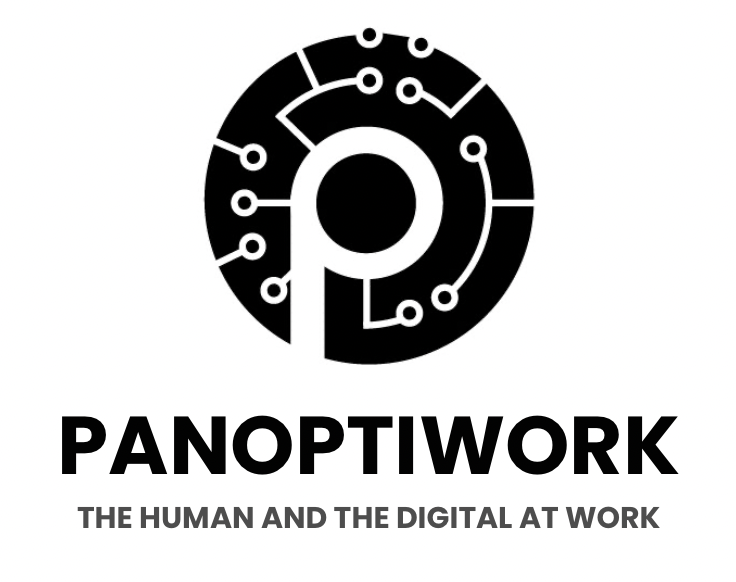
Looking Back on Our Seminars: Exploring Labour and Digital Technologies Across Disciplines
Over the past year, our seminar series has explored the diverse and complex landscape where labour intersects with digital technologies. The impetus behind the Panoptiwork project was the recognition that the contemporary relevance and multifaceted nature of these topics called for cross-disciplinary scholarship. By bringing together experts from various fields, we have fostered multidisciplinary discussions that illuminate the evolving dynamics of work in the digital age. These seminars have provided valuable insights into how technological advancements are reshaping—amongst other things—labour laws, workplace surveillance, contemporary capitalism, workers’ subjectivities, job automation, and the ideological foundations of discourses on AI. Here’s a comprehensive look back at the seminars we organized, highlighting key themes and contributions from each session.
Seminar 1: Decolonising Labour Law in the Data Driven Economy
Speaker: Dr. Flavia Maximo, (Labour Law, Universidade Federal de Ouro Preto).
Visiting from Brazil, Flavia Maximo initiated our series with a thought-provoking examination of the colonial roots embedded within labour law, particularly in the context of the data-driven economy. By questioning the epistemic subject of labour law and the lives it protects, Maximo emphasized the necessity of decolonizing labour law to bridge the gap between its theoretical foundations and the lived experiences of marginalized communities, especially women, black, brown, and indigenous persons in the Global South.
Speaker: Michele Molè (Labour Law at the Faculty of Law, RUG)
Michele Molè presented a compelling analysis of modern workplace surveillance. Through three illustrative stories, Molè highlighted how technology shapes surveillance practices, reinforces workplace hierarchies, and challenges the protection of workers’ rights. The seminar underscored the pressing need for labour protection frameworks to evolve in response to the hidden, tech-mediated supervision prevalent in contemporary workplaces.
Seminar 3: How AI Fosters Global Inequalities
Speaker: Pr. Antonio Casilli (Sociology at the Institut Polytechnique de Paris)
In our largest event of the year, hosted at the House of Connections of the RUG, Antonio Casilli shifted the focus of discussions on AI to the overlooked human labour behind these technologies. He exposed the essential yet often underpaid and under-recognised roles of data workers, such as crowdworkers and microworkers, in developing AI systems. This session brought attention to the global inequalities perpetuated by AI, emphasizing the need to acknowledge and address the labour that fuels technological advancements. His keynote was followed by comments from an interdisciplinary panel of Panoptiwork members (Wike Been; Beryl ter Haar; Tatiana Llaguno Nieves; Femke Cnossen; George Azzopardi; Seonok Lee) who critically reflected on the productive or frictional points of contacts between Casilli’s perspective and their own disciplines.
Seminar 4: Industry 4.0 + Industry 5.0 = A Happy Marriage Between Human and Technology
Speaker: Pr. Beryl ter Haar (European and Comparative Labour Law at the Faculty of Law, RUG; University of Warsaw)
Beryl ter Haar discussed the transition from Industry 4.0 to Industry 5.0 as opening opportunities for developing a human-centric approach to technological development. By integrating a human dimension into technological advancements, ter Haar argued for a balanced relationship between productivity and human well-being, urging for regulations that ensure new technologies contribute positively to human lives.
Seminar 5: Gig Workers in the Platform Metropolis: Delivery Workers in the Netherlands and South Korea
Speaker: Dr. Seonok Lee (Department of Minority and Multilingualism at the Faculty of Arts, RUG)
Dr. Seonok Lee’s research on delivery workers in the Netherlands and South Korea provided a critical lens on the realities of platform capitalism. This seminar explored how digital intermediaries, or platforms, act as private regulators, often evading traditional labour regulations. Building on her ethnographic research, Lee developed an analysis of gig workers’ conditions in dense urban areas highlighted the dual nature of platform labour—simultaneously enabling and exploitative.
Seminar 6: Regulating New Surveillance Technologies at Work: A Human Computer Interaction Approach
Speaker: Dr. Sandy Gould (School of Computer Science and Informatics at Cardiff University)
Third and final visiting scholar of our series, Sandy Gould’s seminar explored the emerging phase of workplace monitoring through advanced surveillance technologies. By linking new surveillance methods to the historical context of Taylorist Scientific Management, Gould emphasized the need for updated critical tools to understand and regulate these technologies. He advocated the need to refine our critiques to address the evolving epistemologies of workplace measurement. Following Gould’s talk, Michele Molè illustrated some of the points made by exposing and analysing the recent decision by the French data protection authority to charge Amazon with a 32 million euro fine for the surveillance practices in its warehouses.
Seminar 7: AI is not a Technology. The History of Technological Rhetoric and Labor Degradation
Speaker: Dr. Jason Resnikoff (Contemporary History at the Faculty of Arts, RUG).
Jason Resnikoff traced the historical discourse of AI back to the concept of automation post-World War II. He argued that the rhetoric surrounding AI often masks the real degradation of labour conditions as technology progresses. By revealing the ideological roots and continuity between 20th century discourses on automation and contemporary discourses on AI, Resnikoff provided a nuanced critique of the labour-replacing narratives prevalent in contemporary discussions about AI.
Seminar 8: The Work of Kpop Idols on Fan Platforms: A Labour Process Analysis
Speakers: Sanghwa Lee and Dr. Robert Prey (Media Studies at the Faculty of Arts, RUG)
Sanghwa Lee and Dr. Robert Prey examined the labour processes of Kpop idols on fan platforms using Labour Process Theory. Turning to these workers often considered to be highly privileged, their analysis nonetheless revealed intricate power dynamics and control mechanisms inherent in the digital interactions between idols and their fans. This seminar expanded the understanding of platform labour by highlighting a unique and often overlooked form of digital work and suggesting wider implications for the transformations of contemporary capitalism.
Seminar 9: What Should a Good Concept of Labour Do? Conceptually Engineering ‘Digital Labour’
Speaker: Miguel Rudolf-Cibien (Research Master’s student at the Faculty of Philosophy, RUG)
Miguel Rudolf-Cibien’s seminar focused on the conceptual debate surrounding ‘digital labour’. Drawing on the works of Sally Haslanger and Axel Honneth, Rudolf-Cibien proposed that the digital labour debate should not be defined by searching for objective criteria, but rather for its social and political functions. This perspective emphasized the political nature of the concept and the need for its intentional shaping to address feelings of misrecognition in society.
Seminar 10: Tasks, Wages and New Technologies
Speaker: Dr. Femke Cnossen (Faculty of Spatial Sciences, RUG)
Dr. Femke Cnossen concluded our series with a presentation of her empirical study on the relation between automation and different types of tasks and technologies. She highlighted the complex interactions between routine, abstract, and social tasks and various technological advancements. Cnossen’s findings pointed to the nuanced impacts of new technologies on wage structures, revealing that the risks and benefits of technology-intensive industries are not uniformly distributed. Centrally, she defended a routine-based – over skill – approach to the study of automation.
Conclusion
This seminar series has allowed us to consolidate and strengthen a network of scholars, practitioners, and enthusiasts in the subjects of labour and technology at the University of Groningen and beyond. We were pleased to host such diverse and engaging discussions, fostering connections and collaborations that extend beyond the seminars themselves.
Looking ahead, we are excited to announce that we will continue this momentum with the publication of a special interdisciplinary issue edited by Panoptiwork, set to be published this Fall in the peer-reviewed Italian Labour Law e-Journal. This issue will feature insights presented during the seminars, and more. Additionally, we will once again be bringing together exciting speakers on labour and technology for the closing conference of our research project, scheduled for December 2nd, 2024, coinciding with the publication of the special issue. We look forward to welcoming both familiar faces and new participants as we continue to engage with these important topics, and are wishing all of you a very nice summer break.
